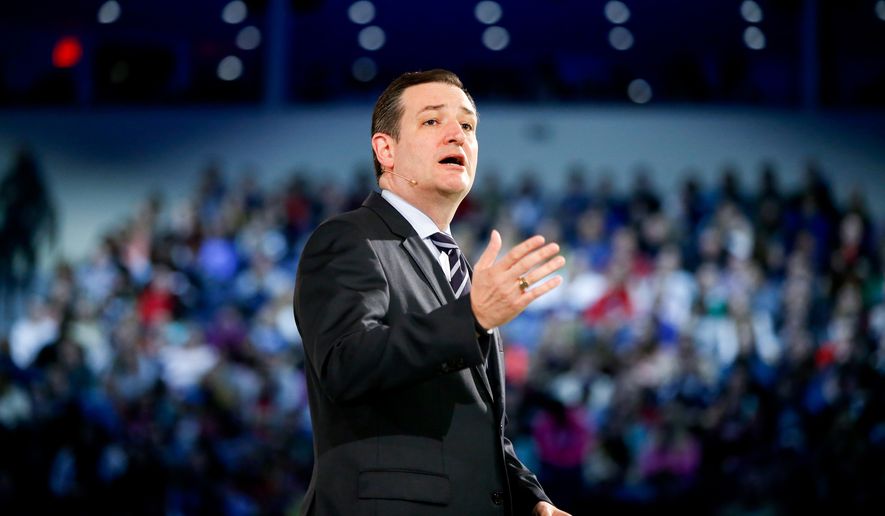A throng of likely Republican presidential contenders came to the defense Monday of Indiana Gov. Mike Pence’s signing of the state’s religious-freedom law, signaling a sharp contrast with Democrats on an issue that could extend into the 2016 race.
Former Florida Gov. Jeb Bush, neurosurgeon Ben Carson, Sen. Ted Cruz of Texas, Louisiana Gov. Bobby Jindal, Sen. Marco Rubio of Florida, and former Sen. Rick Santorum of Pennsylvania spoke out in favor of the Indiana Religious Freedom Restoration Act, similar to a law already passed by 19 other states and the federal government.
“Nobody is saying that it should be legal to deny someone service at a restaurant or at a hotel because of their sexual orientation. I think that’s a consensus view in America,” Mr. Rubio said on Fox News on Monday. “The flip side is, should a photographer be punished for refusing to do a wedding that their faith teaches them is not one that is valid in the eyes of God?”
Mr. Bush said that the Indiana governor did “the right thing” by signing the measure last week, and that critics would change their minds if they knew more about the measure.
“I think if they actually got briefed on the law that they wouldn’t be blasting this law. I think Gov. Pence has done the right thing,” said Mr. Bush in a radio interview Monday evening on the Hugh Hewitt Show.
Mr. Bush pointed out that Florida has a similar Religious Freedom Restoration Act, passed in 1998, which was modeled after the federal law signed in 1993 by President Bill Clinton.
SEE ALSO: Indiana religious freedom act criticized by officials in states with similar laws
“This is simply allowing people of faith space to be able to express their beliefs, to have, to be able to be people of conscience,” Mr. Bush said. “I just think once the facts are established, people aren’t going to see this as discriminatory at all.”
The Republican response comes in sharp contrast to that of White House spokesman Josh Earnest said Sunday on ABC’s “This Week” that the law “seems to legitimize discrimination.”
Former Secretary of State Hillary Rodham Clinton said on Twitter that she was “sad” to see the Indiana law approved, even though her husband signed the similar federal measure. Mrs. Clinton is easily leading every poll of possible candidates for the 2016 Democratic presidential nomination.
Mr. Pence’s signing Thursday of the Indiana RFRA ignited an outcry, including calls for an economic boycott, from those claiming the Indiana law ushers in a “license to discriminate” on the basis of religion against gays.
Mr. Cruz released a statement Monday saying he was “proud to stand with Mike, and I urge Americans to do the same,” while Mr. Carson and Mr. Jindal issued statements of support to Breitbart News.
Mr. Pence refused to say explicitly in a Sunday interview on ABC’s “This Week” whether the law would offer protections to Christian florists and bakers who refuse to participate in gay weddings, in part because the law simply changes some legal burdens and standards of proof — it doesn’t pre-determine the outcome of every possible dispute or provide a blanket exemption to anti-discrimination laws.
But Mr. Bush cited such examples in his support for the Indiana law.
“[T]here are incidents of people who, for example, the florist in Washington state who had a business that based on her conscience, she couldn’t be participating in a gay wedding, organizing it, even though the person, one of the people, was a friend of hers,” said Mr. Bush, referring to Arlene’s Flowers owner Barronelle Stutzman.
“And she was taken to court, and is still in court,” Mr. Bush said. “Or the photographer in New Mexico. There are many cases where people acting on their conscience have been castigated by the government. And this law simply says the government has to have a level of burden to be able to establish that there’s been some kind of discrimination.”
Defenders of the Indiana law argue that 20 states have passed a RFRA with no resulting discrimination.
• Valerie Richardson can be reached at vrichardson@washingtontimes.com.




Please read our comment policy before commenting.